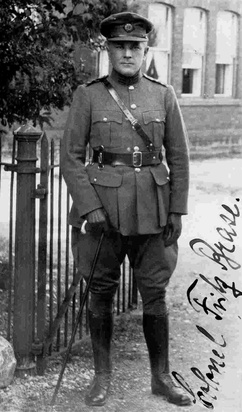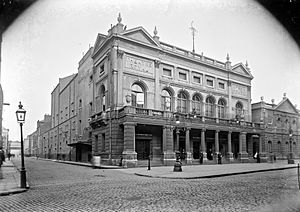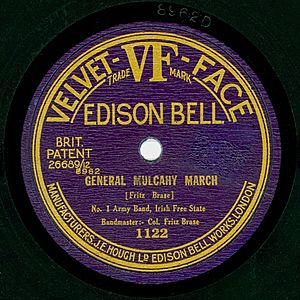Fritz Brase facts for kids
Quick facts for kids
Fritz Brase
|
|
|---|---|

Signed portrait of
Brase in Irish Army uniform |
|
| Born |
Friedrich Wilhelm Anton Brase
4 May 1875 Egestorf, Germany
|
| Died | 1 December 1940 (age 65) Dublin, Ireland
|
| Resting place | Mount Jerome Cemetery |
| Nationality | German |
| Occupation | Army band leader |
| Years active | 1893–1940 |
| Spouse(s) | Elisabeth Henriette Antonie Brase |
| Children | Mona |
Fritz Brase (born Friedrich Wilhelm Anton Brase; 4 May 1875 – 1 December 1940) was a talented German bandmaster, conductor, and composer. He is best known for his important work in Dublin, Ireland. There, he led the very first Army School of Music in the new Irish Free State.
Contents
Life Story of Fritz Brase
Early Life and Education
Fritz Brase was born on May 4, 1875, in Egestorf, a town near Hanover, Germany. His father was a miller. Fritz studied music at the Conservatory of Music in Leipzig. He learned from famous teachers like Carl Reinecke and Max Bruch.
Moving to Ireland
In 1923, Brase moved to Ireland. A few years later, in 1924, his daughter Mona was born at the Curragh Camp. Fritz, his wife Elsa, and Mona later moved to Beggars Bush Barracks in Dublin. They eventually bought their own house in Sandymount, a suburb of Dublin.
Later Years and Legacy
Fritz Brase passed away on December 1, 1940, just one day after he retired. He was buried in Mount Jerome Cemetery in Dublin. The No. 1 Irish Army Band played at his funeral. His daughter Mona is also buried there. Today, a street in Münster, Germany, is named Braseweg in his memory.
Fritz Brase's Musical Journey
Starting in Military Music
Fritz Brase began his musical career in 1893. He joined a military band in Bückeburg, Germany. His skills as a conductor and arranger were so good that he went on to study at the Hochschule für Musik, Berlin. There, he learned from more great musicians.
In 1906, he became the conductor of a band in Münster. By 1909, he was promoted to "Royal Music Director" in Prussia. In 1911, he got one of the most important jobs in German military music. He became the conductor of the 1st (Emperor Alexander) Guards Grenadiers band. After World War I ended in 1919, Brase left the military. He spent four years conducting a police band in Berlin.
Building Irish Military Music
In 1923, General Richard Mulcahy invited Brase to Ireland. General Mulcahy wanted Brase to create and lead the Irish military music program. Brase arrived in Ireland on March 1, 1923, with his friend Friedrich Christian Sauerzweig. Sauerzweig was also a musician from the Berlin Philharmonic.
Brase was excited to become a full colonel in the Irish Army. He took on the role of the first leader of the Army School of Music. He also became the inspector of the Irish Military Music Corps. Later that year, he formed the famous Army No.1 Band. He also directed the Military Music School in Dublin.
Brase worked very quickly. Just seven months after arriving, his new army band gave its first public concert. This happened in October at Dublin's Theatre Royal. By December, the band had already recorded its first two records!
Impact on Irish Culture
By 1928, Brase had helped create four military bands in Ireland. He focused most on the "Army No. 1 Band." Bringing German musicians like Brase to Ireland helped the new country develop its own culture, separate from British influence.
Brase and his band traveled all over Ireland in the 1920s and 1930s. They played at many celebrations, both indoors and in public places. He also started a special series of concerts for primary school children in Dublin. Thousands of Irish students attended these concerts over the years.
In 1927, Brase also helped start the Dublin Philharmonic Society. This was a successful orchestra and chorus. He led it until 1936, when he had to stop due to health reasons. At the Army School of Music, he taught many important Irish musicians. These included Michael Bowles, Arthur Duff, and Dermot O'Hara.
Brase as a Composer
Fritz Brase had a big impact on the cultural life of the young Irish republic. He was also a very active composer. He wrote many pieces beyond just military band music. He composed a Symphony in D major, which was performed in 1908. He also wrote other orchestral works.
For the army bands, he wrote many original pieces. These included the General Mulcahy March and six Irish Fantasias. He also arranged many traditional Irish tunes for military bands. His first Irish Fantasia was played in 1926. This was during the very first broadcast of 2RN, which is now Radio Telefís Éireann. He even wrote the official arrangement of the Irish national anthem for the station.
Fritz Brase and the German Community
Fritz Brase was one of a small number of Germans living in Ireland in the 1930s. Many of these Germans were invited by the Irish Government to help with new industries.
Brase was involved in some events with the German community in Dublin. For example, he attended Christmas parties held in grand hotels like the Royal Hibernian Hotel and Gresham Hotel. At a 1937 event, Brase played the piano while children performed for the adults.
Selected Compositions
Brass band
- Hoch die 7ten Jäger (1897)
- Bienenhaus Marsch (c. 1900)
- Jugenderinnerungen Marsch (1901)
- Heil Danzig (1910)
- Exzellenz von Bernhardi (1910)
- Grosse Zeit, neue Zeit (1910)
- General Mulcahy March (1923)
- Irish March No. 2 (1923)
- Irish March No. 3 (1923)
- Irish Fantasia No. 1 (1923)
- National March (1924)
- Irish Fantasia No. 2 (1924)
- Irish Fantasia No. 3 (1924)
- Irish Fantasia No. 4 (1925)
- Funeral March (1926)
- Irish Fantasia No. 5 (1927)
- Irish Fantasia No. 6 (1930)
- Der Gott, der Eisen wachsen liess (1933)
- Flieger-Escapaden (1935)
Orchestra
- Heimatlos (1902)
- Dramatische Ouvertüre (1902)
- Symphony in D major (1905)
- Westfalen (1912)
- Menuett, for salon orchestra (1921)
- Paraná, for salon orchestra (1926)
- Irlandia, suite (1932)
- Episoden-Suite (1937)
- Irish Dance No. 1: The Londonderry Clog (published 1938)
- Irish Dance No. 2: The Frost is All Over (published 1938)
- Irische Lustspiel-Ouvertüre (1939)
- Donegal. Rhapsody for orchestra No. 2 (1939)
Piano
- Strebe vorwärts, Op. 1
- Mazurka brilliante, Op. 2 (1894)
- Mazurka brilliante, Op. 4 (1895)
- Waltz, Op. 7 (1896)
- Capriccio, Op. 12 No. l (1898)
- Die Garde an der Somme (c.1915–16)
- Joska (1920)
- Menuett (1921)
- Pierette (1921)
- Waldmärchen (1921)
- Orchideen (1922)
- Herbst (1923)
- Little Moira, serenade (1925)
- Horse Show March (1926)
- Bi-centenary March 1731–1931 (London: Boosey and Hawkes, 1931), online
- Helden im Volksmund. Eine deutsche Rhapsodie (1933)
Other Music
- Several songs for voice and piano
- Some chamber music, like Nymphentanz, Op. 9 (for violin and piano, 1898)
Selected Recordings
- Maientraum by Kapelle des Kaiser Alexander Garde Grenadier-Regt. No. 1, Berlin, written and conducted by Brase.
- Fruhlingszauber by Kapelle des Kaiser Alexander Garde Grenadier-Regt. No. 1, Berlin, conducted by Brase.
- Große Zeit, Neue Zeit (1912)
- Der Gott, der Eisen wachsen ließ
- Himmelstürmer Luftwaffe march
- General Mulcahy March
- Irish Fantasia No.1 (1924)
- Serenade and Minuet by No. 1 Army Band, Irish Free State (1925)
- Irish National March Pathé News video
- Many orchestral arrangements of Irish folk music.
Discography
- Irish Fantasia No. 1, performed by The Band of the Irish Guards, Andrew Chatburn (conductor), on: Specialist Recording Company SRC 121 (CD, 2003).
- O'Donnell Abú; Irish Dance No. 2: The Frost is All Over; Irish Army March (General Mulcahy March); John F. Larchet: Lament for Youth (arranged by Fritz Brase), performed by The Band of the Irish Defence Forces, Mark Armstrong (conductor), on: RTÉ lyric fm CD 157 (CD, 2018).
 | Selma Burke |
 | Pauline Powell Burns |
 | Frederick J. Brown |
 | Robert Blackburn |



